- Home
- Anne Rivers Siddons
Islands Page 19
Islands Read online
Page 19
Fairlie had ridden out with them. I had seen Fairlie’s sea-green silk before, a shimmery column that dipped up to the knee in front, and left one elegant shoulder bare. But whatever she wore, it was not possible to look away from Fairlie for very long. Her spectacular red-and-silver hair brushed her shoulders, and two hectic red spots stood out on her cheeks. I had seen those spots before. They were anger, not rouge. Fairlie looked…incendiary. I thought, moving to kiss her cheek as she came into the kitchen, that it could not always be comfortable being married to Fairlie. Exhilarating, beguiling, amusing, yes. But rarely simply comfortable. I had never thought Henry minded, particularly; he gave no sign of it. But I thought also that I would not like to get the full bore of those flaming blue eyes, as he would when he finally got here.
It could have been another tense evening, but Camilla’s incandescent happiness simply banished tension. She sat beside the fire with happiness flowing off her like honey, and none of us would have spoiled the night for her any more than we would have slapped a child. We smiled at her reminiscences of our holidays on the island with as much glee as she did; when she laughed, we laughed with her, delightedly, as you do at a small child’s belly laugh. Before long we were simply giddy on Camilla. She could have asked us to jump off the widow’s walk and we would have rushed to do so.
I had a sudden thought.
Bunny Burford was right, I thought. She does get what she wants. And we give it to her gladly. She does it with sheer laughter and love; who could refuse that? If that’s manipulative, it’s also enchanting, a gift to all of us. It may even be what’s held us together for so long. I always thought it might be the house, but maybe it’s simply Camilla. It’s like a spell, or sorcery.
And I smiled at my old friend with love and amusement. She smiled back, a smile that warmed and enfolded. You are the most special thing in my life, it said.
“I’m not going to wait one more minute for Henry,” Fairlie said, getting up to look in on her asparagus. “He can just eat leftovers. The rest of us are starving.”
Of us all, Fairlie was the only one who seemed impervious to Camilla’s spell. She sat straight in her chair by the fire, her beautiful back totally upright, her legs crossed, one foot swinging. I was reminded of the lashing tail of a great cat. Her mouth was a straight line and her narrowed eyes were fixed on Camilla. I could not imagine what she was thinking; if she was angry, let her confine it to Henry.
She went into the kitchen, and we all stirred and looked at Camilla. She was looking after Fairlie with a sort of tender bemusement.
“Perhaps she’s right,” she said. “Henry could be held up for who knows how long.”
We were getting up from our chairs, reluctant to lose the magic of the last hour, when there was a thundering of footsteps on the back steps, and the door flew back on its hinges, and Henry hurtled into the kitchen, grinning and breathing heavily, as if he had been running for miles.
“Tell me I didn’t miss dinner,” he said.
We all burst into laughter. He wore rumpled blue hospital scrubs and the clogs many surgeons wear when operating, and over them his perfectly fitted tuxedo jacket and a black tie, untied and hanging crazily down the front of him. His long face wore its customary beatific smile, and his silver hair was in his eyes. Suddenly I simply and wholly loved him.
Camilla ran to him and hugged him fiercely. Then she tipped her head back and looked up into his face.
“I love you, you idiot,” she cried. “Who is more wonderful than you are?”
And the night lifted up and flowed on again, borne up by joy.
We sat late at dinner. Camilla had brought out her mother’s huge silver candelabra, and in the middle of the table the ivory tapers burned steadily. The table itself was swathed in Lila’s mother’s silky white damask. The matching napkins, I thought, might have served as tea-table cloths.
“Mother always called them the double-damask dinner napkins,” Lila said. “She always washed and ironed them herself. Eliza could out-wash and out-iron her any day, but Mother wouldn’t let anybody else touch them. Woe unto whoever spilled anything on them, or actually used them to dab their lips. I have a great urge to dump red wine on every one of them.”
“I know just what you mean,” Camilla said. “Once, when I was about eight, I used Mother’s napkins to make bandages for the hospital I was starting. The dogs were my patients. You can imagine what dog drool does to old damask.”
“I carved my initials in our linoleum once,” I said. “Mother never noticed it until she sobered up, four years later.”
The table burst into laughter. My origins were part of our history now, my provenance ours. No one was ill at ease with it.
Dinner was glorious. We ate until about eleven, and drank a great deal of the lovely, fruity merlot Simms had brought, along with the champagne. In the living room the fire hissed and snickered, sighing as it settled into embers. Outside the wind rose.
Finally Camilla got up and went into the kitchen.
“No looking,” she said. We had nearly finished another bottle of wine when she came out, bearing a baked Alaska on a silver tray. It was high and intricately swirled, and its meringue was delicately browned. She had surrounded it with the suicidal early camellias that bloom in Charleston gardens around Christmas. We drew in our breath in a collective gasp of pleasure. It was perfectly right.
“I haven’t had baked Alaska since…well, I think it was your birthday party, Camilla,” Lila said. “We must have been about ten. I remember so clearly Elsie bringing it out on the veranda where we were sitting at little tables, and telling us to eat it quick because it was going to melt in a minute.”
“And it did,” Camilla said. “Do you remember what Lewis and Henry and Simms did with it?”
“Had a snowball fight,” Lewis said. “Only one I ever got to have in Charleston. God, your mother was furious with us. I haven’t had baked Alaska since.”
I felt a stab of, not envy, but loss, that I had not shared their rich collective childhood. I had never in my life had baked Alaska.
It was a night for memories.
“Remember the time we were going to some formal thing or other and none of you guys had black ties? I forget why,” Lila said. “We had all met at my house, and Mother called Mr. Garling himself, and he went down and opened the store, and was standing out on the street corner when we drove by, and he handed in three ties. You put them on in the car.”
“Princes of the city,” Fairlie muttered. It was not said fondly. What was the matter with Fairlie? I thought again.
“It seems like yesterday,” Camilla said, leaning back in her chair. “Time is funny. When I was young, I used to think it went in a straight line, from one place to another, but now it seems like it sort of curves all over the place and doubles back on itself. You can be anywhere at all, any time. What do they call that thing?”
“A Möbius strip,” Henry said. “That’s a nice idea. You could go back and visit your life anywhere and any time you wanted.”
“It sounds like flypaper,” Fairlie said.
Camilla sighed deeply, and looked at her watch.
“If I could freeze time, this is exactly where I’d do it,” she said, smiling around the table at us. “I’d keep us and this night just like we are now. But since I can’t, let’s do the next-best thing. It’s a surprise. We’ve got thirty minutes till midnight. I need you all to come out in back with me.”
“You’ve got to be kidding,” Fairlie said. “It must be thirty degrees out there. I didn’t bring a coat.”
“Wrap up in a blanket,” Camilla said. “You can’t miss this.”
We bundled ourselves into whatever we could find.
“Give me five minutes,” Camilla said. “And I need to borrow Henry.”
“When didn’t you?” Fairlie said, almost inaudibly.
I thought I was the only one to hear her. It was true. Camilla had asked Henry for help of one sort or another many times since Charl
ie died, and he had given it affectionately and without question. So what? The other men had come to her aid at times, too. We all had. We were, after all, the Scrubs.
I watched as she and Henry went out the back door and vanished down the steps. She had on her old raincoat and seemed to float on Henry’s arm like a captive cloud. From the back you did not notice the cruel hump. As they vanished out of sight down the steps, she was saying something to him, and he was bent close to listen, laughing.
“Now,” she called up presently, and we went out into the cold of the dying century.
Someone had put up the old tiki torches in a circle in the sand, and lit them, and the glow was both beautiful and unearthly. In the center of the circle they made sat a group of large tin boxes and cans, half sunk in the sand. Just outside the circle was an aluminum washtub filled with champagne on ice. Beside it was a tray of those ghastly plastic flutes that you can buy in grocery stores around the holidays.
We were silent, looking at Camilla and Henry.
“Fireworks,” Camilla said, laughter caught in her throat. “Charlie absolutely loved them. Henry got as many of the fancy ones as he could find, and we’re going to shoot them off at midnight. Light up the whole sky. Let Charlie and everybody else know the Scrubs are still here.”
And we did. We filled the awful glasses full of the wonderful champagne, and held them up in silent toasts to one another, and as the bells of all the churches in Charleston and Mount Pleasant and Sullivan’s Island rang out, and the great eruption of fireworks from the waterfront park across the bay in Charleston bloomed into the sky, Henry reached down and lit the fuses.
“Get back,” he said, and we jumped back just as there was a great whump and the air exploded with the sound and light and color. Streaking arcs shot into the sky and became multiple showers of pure color, drifting slowly toward the earth. Great bangs produced green, blue, and red flowers, never seen in an earthly garden. Exploding stars seemed to shriek in midair, and died gently on the sand in tiny sizzles of yellow and silver. It was amazing, an aurora borealis that we had created for Charlie at the birth of this looming epoch.
No one spoke for a long moment, and then Lila whispered, “What are they, Henry?”
“Cherry bombs, screamers, Roman candles. Only not the old ones we used to shoot off when we were kids. These are the real deals. I got them at a stand on West Ashley. We probably needed a permit.”
“If we didn’t get a permit to launch Charlie,” Fairlie said, grinning, “we sure as hell don’t need one to shoot off a few firecrackers.”
After the last spark had settled to earth and vanished like a snowflake, we all kissed. We had never done this at our other New Year’s Eve celebrations, only with our husbands or wives, but this seemed the natural and indeed the only thing to do. Lewis kissed me deeply and long, his hands in my hair. Simms’s mustache brushed and tickled as he bent down to me. Henry’s kiss was soft, and as sweet and unaffected as Henry himself.
“Happy New Year, pretty girl,” he whispered.
“Happy New Year, Charlie,” Camilla said in a light, clear voice.
Mine were not the only wet eyes as we went back up the stairs and into the warm house.
“I brought brandy,” Camilla said. “Let’s have some in front of the fire before we go to bed. I hate to let this night go.”
We sat before the dying fire, mostly quiet, sipping the old Courvoisier. My mind, lulled with brandy and firelight, did not alight on any one thing, but hovered back and forth over the years in this house, sipping at them like a hummingbird. Lewis sat on the rump-sprung sofa beside me and held my hand, his finger tracing soft scrolls on my wrist. For a long time no one spoke.
Then Camilla said, “There’s one more thing. I’ve been thinking for a long time about how to end this night, and I think this is perfect. I hope y’all will agree. Let’s renew our vows. Let’s repeat the Scrubs’s sacred oath to take care of each other forever, and swear it on the photograph, like we did way back when.”
Her eyes and skin glowed, and her mouth curved in the soft smile she smiled when she had done something to please one of us, a smile of pleasure and gratitude at being allowed to serve. If she had asked me at that moment to swear to murder, I would have done it.
We all raised our voices in delighted agreement. Like the rest of Camilla’s night, it was simply the perfect thing to do.
Simms had stood up to get the photograph from its place on the wall when Fairlie said, “Oh, let’s wait till the next time we’re out here. We’ve really got to get back to town, and I don’t want to rush it.”
We all stared at her. Her cheeks were flaming.
“You aren’t staying over?” Camilla said. They always did, on New Year’s Eve. We all did.
None of the rest of us spoke. Strangeness curled into the air.
“Well, I just wanted to start off the next thousand years in my own bed.”
“Your own bed is upstairs, too,” Camilla said softly. She looked at Henry, who would not meet anyone’s eyes. Finally he raised his own to Camilla’s, and then to all ours.
“We have something to tell you,” he said. “There’s no sense in waiting.”
“Henry!” Fairlie spat. “You promised….”
“It’s not right, Fairlie. We’ve let it go too long,” he said, and his voice was steely and even. I had never heard him speak so to her. My breath seemed to stop. Whatever it was, I suddenly wished I might die before I heard it.
“You know I’ve been talking about retiring,” he said. “We’ve decided that I’ll do it early next summer, and…that we’ll go to Kentucky.”
He paused, as if waiting for us to reply, but no one did. Camilla made a soft sound of pain but did not speak. Fairlie was looking steadily into the fire, her lips a tight line.
“Fairlie’s given up most of a lifetime to me and Charleston,” Henry said, almost pleadingly. “It’s only fair to spend the rest of it in her place. Her brother is selling us the family’s farm, and Fairlie’s going to have horses. All her old friends are there, and she’s always wanted to breed flat racers.”
“And what will you do?” Lewis said, his voice quiet and thick. I knew that he was near tears, or real anger. For myself, I only felt a white, ringing shock.
“Muck out the stables,” Henry said, but his voice was not behind the joke. “No, I’ll spend a lot more time with the flying docs, and maybe do some consulting work in Louisville. It’s not far. And we’ll be here every summer. We’ll want to see Nancy and the kids, and of course, we can’t do without you all. We’ll have lots of time. That’s what retirement is for.”
Still, no one spoke. In the silence I could hear the crashing of walls, the pattering rain of mortar.
There was a flurry of polite conversation then, all of us murmuring our good wishes and agreeing that of course we’d see them, almost as much as we did now. I knew that no one believed it. Fairlie’s eyes were fixed far away from this house on the island. I wondered if she’d ever really loved it. I wondered if I’d ever really known her.
They got up to go, and Camilla went to them and kissed both of them on the cheek.
“Nothing matters but that you’re happy,” she said. Her eyes were closed. I did not want to look into them. Henry’s were blank.
After they had gone, we went, one by one, up the stairs to our bedrooms. There did not seem to be anything else to say. In the high old bed in the room that had always been ours, Lewis and I clung close together under the dusty piled quilts. Once he started to say something, but I shook my head against his neck, and he did not. After a while, I think he slept.
But I did not, not for a long time. I lay still, watching the dust-speckled path of the moon arch over our bed and finally fade away. Camilla’s room was next to ours, and I heard no sound from it, though I listened. I thought that I might get up and go to her if it sounded as though she was in distress. But the night was silent, except for the wind and the peppering sand on the windowpanes.
I had a very strong sense of her, though. It was almost as if I could see and feel her through the wall, physically touch her. I felt the presence of Camilla Curry in the next room almost painfully clearly, Camilla lying absolutely still and silent, alert in every atom of her being. I had the odd sense that she was keeping watch.
The first Tuesday of the new year I was scheduled to fly to New Orleans for a consultation trip. I was still feeling shocked and bruised, almost physically, and did not want to go.
“Go on,” Lewis said. “It’ll help.”
So I made my plans.
The morning of the day I was to leave, Fairlie called me. The sound of her voice jolted me, as if she had spoken from the grave. But it was her normal voice, rich and slow, this time full of annoyance.
“I am so mad at Henry I could spit,” she said. “He’s going out of town tonight with those damned flying fuckers, and he’d promised me he’d take me to see Tosca at the Galliard. I’m going to run away from home. Want to come out to the island with me and spend a couple of nights? We could have a slumber party. Give each other Tonis and stuff.”
It was as if she had never murdered the Scrubs with one stroke.
“I’m going out of town, too,” I said, keeping my voice as neutral as I could. “Sounds fun, though. Maybe Camilla would like to go.”
“No,” Fairlie said. “She said she had the flu. She sounded terrible.”

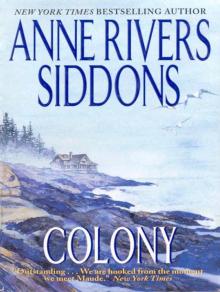 Colony
Colony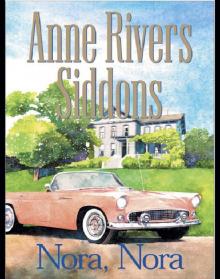 Nora, Nora
Nora, Nora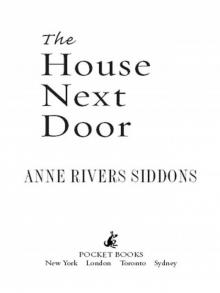 House Next Door
House Next Door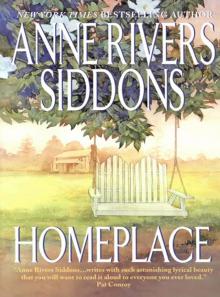 Homeplace
Homeplace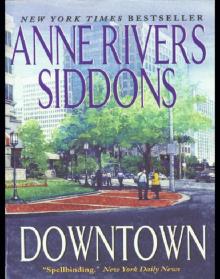 Downtown
Downtown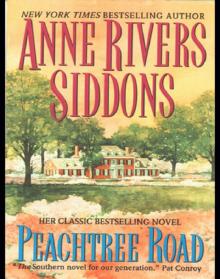 Peachtree Road
Peachtree Road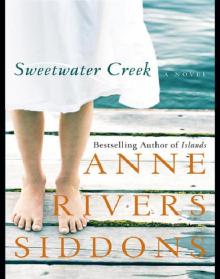 Sweetwater Creek
Sweetwater Creek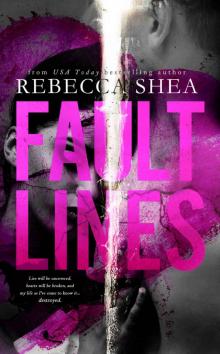 Fault Lines
Fault Lines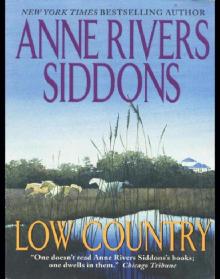 Low Country
Low Country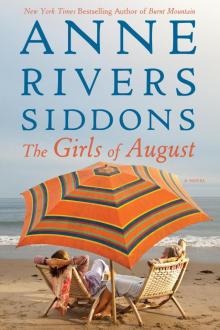 The Girls of August
The Girls of August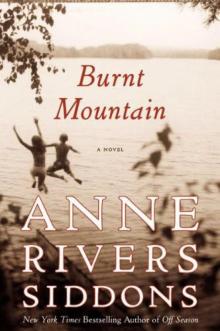 Burnt Mountain
Burnt Mountain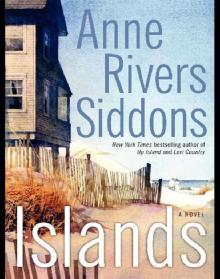 Islands
Islands